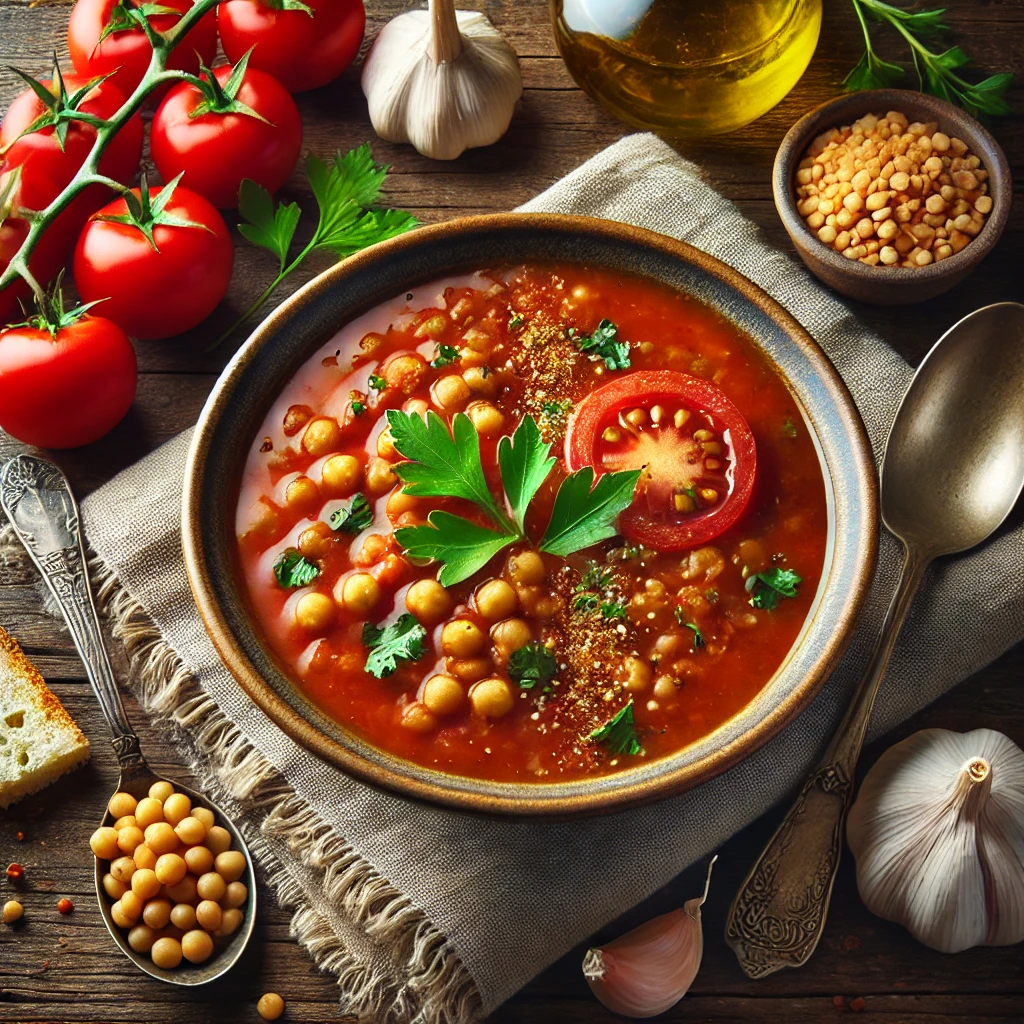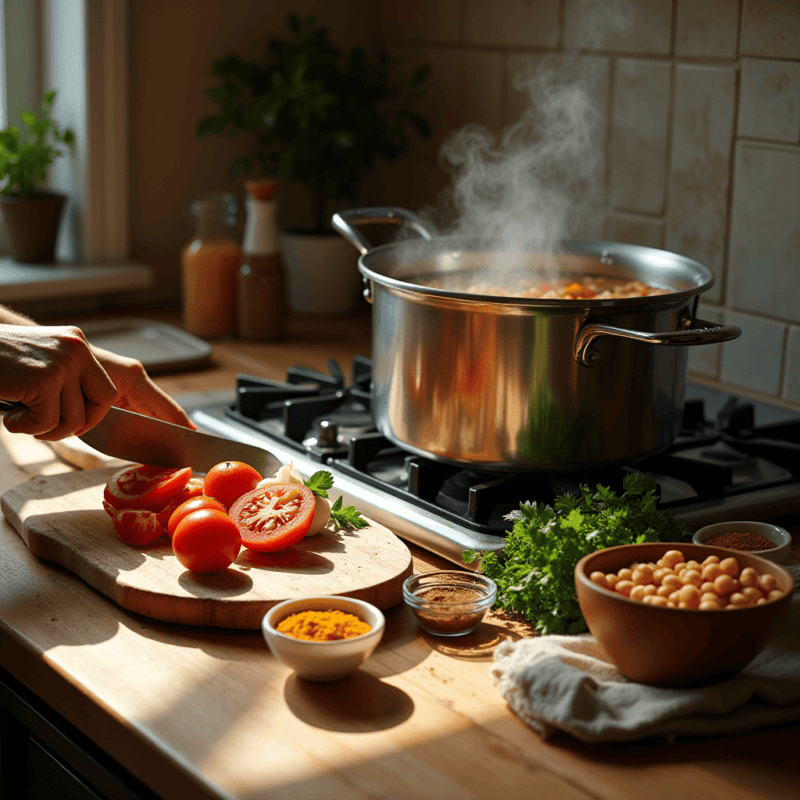
Mediterranean soups are celebrated for their vibrant flavors, fresh ingredients, and numerous health benefits. Originating from countries bordering the Mediterranean Sea, these recipes combine the rich culinary traditions of Greek, Italian, Spanish, Moroccan, and other regional cuisines.
Each dish tells a story of culture, climate, and history, highlighting the importance of seasonal ingredients. Mediterranean soup recipes, in particular, often serve as a cornerstone of Mediterranean gastronomy.
Why Mediterranean Soups Are Central to the Cuisine
Soups are deeply ingrained in Mediterranean cuisine. The best Mediterranean soup recipes are not just meals; they’re experiences. For example, Spanish gazpacho is a refreshing cold soup perfect for hot summers, while Moroccan harira is a hearty dish enjoyed during Ramadan.
Furthermore, Mediterranean soup recipes reflect the connection to the land, featuring seasonal vegetables, legumes, grains, and proteins. These soups are incredibly versatile and form an essential part of the Mediterranean diet.
Explore More: Discover the Mediterranean Salmon Recipe to complement your Mediterranean soup meals.
Is Mediterranean Soups Good for You?
Mediterranean soup recipes are as nourishing as they are delicious. Following the principles of the Mediterranean diet, they provide numerous health benefits, including improved heart health, better weight management, and reduced inflammation.
Nutritional Powerhouses in Mediterranean Soups
The ingredients commonly used in Mediterranean soup recipes, such as tomatoes, olive oil, garlic, and legumes, are rich in vitamins, minerals, and antioxidants. These nutrients help boost immunity, improve skin health, and promote overall wellness.
Heart-Healthy Fats in Mediterranean Soups
A signature feature of Mediterranean soup recipes is the use of olive oil, which is loaded with monounsaturated fats that support cardiovascular health.
Rich in Fiber and Protein
Vegetables, lentils, chickpeas, and beans provide fiber and protein, keeping you full longer while supporting digestion. Including lean meats, fish, or plant-based options further enhances the nutritional profile of Mediterranean soup recipes.
Overall, the health benefits of Mediterranean soups go beyond their ingredients. In addition, these dishes are often lower in sodium and saturated fat compared to many other soups. Therefore, they’re an excellent choice for anyone looking to eat clean and live well.
Core Ingredients in Mediterranean Soup Recipes
No Mediterranean soup recipe is complete without these essential ingredients. They define the distinctive flavors and health benefits associated with these dishes.
1. Olive Oil: The Heart of Mediterranean Soups
Olive oil serves as both a flavor enhancer and a source of health. Its bold, slightly peppery taste elevates Mediterranean soup recipes, making it a vital component of the cuisine.
2. Vegetables and Legumes: Nutrient-Packed Ingredients
Key vegetables like tomatoes, zucchini, carrots, and legumes such as chickpeas and lentils are staples in Mediterranean soup recipes. They provide essential nutrients and form the foundation of these dishes.
3. Herbs and Spices: The Secret to Flavorful Mediterranean Soups
Herbs like oregano and thyme, along with spices like paprika and cumin, bring depth and character to every Mediterranean soup recipe.nd cumin give Mediterranean soups their distinctive flair.
4. Protein Sources: Chickpeas, Lentils, and Lean Meats
While Mediterranean soups are often vegetarian, proteins like fish, chicken, or lamb are occasionally featured. Plant-based proteins such as chickpeas and lentils are also popular, offering a healthier, fiber-rich alternative.
Types of Mediterranean Soups to Try
The diversity of Mediterranean soup recipes showcases regional preferences and creative use of ingredients:
1. Tomato-Based Soups
Tomatoes form the base of many Mediterranean soups, like Spanish gazpacho, a cold soup perfect for summer. Warm tomato soups, often infused with basil and garlic, are staples in Italian and Greek kitchens.
2. Lentil Soups
Lentils are a Mediterranean favorite in hearty dishes like Greek fakes soupa. These soups are simple, nutritious, and spiced with cumin, coriander, or bay leaves for added depth.
3. Seafood Soups
Coastal regions excel in seafood-based soups. Italian cioppino and French bouillabaisse combine fish, shellfish, and aromatic vegetables in light yet flavorful broths.
4. Vegetable Broths
Mediterranean vegetable broths are versatile and light, often seasoned with a hint of olive oil, lemon juice, and fresh herbs. They serve as comforting meals on their own or as bases for more elaborate recipes.
Classic Mediterranean Soups
When discussing the best Mediterranean soups, certain dishes are classics:
1. Greek Avgolemono Soup
This creamy soup, made with chicken broth, rice, eggs, and lemon juice, is a Greek classic. It’s a comforting dish with a tangy twist, perfect for cooler weather.
2. Italian Minestrone
A hearty soup packed with seasonal vegetables, beans, pasta, and a hint of Parmesan cheese. Minestrone is a vibrant showcase of Italian culinary tradition.
3. Spanish Gazpacho
Gazpacho is a chilled tomato-based soup with cucumbers, bell peppers, garlic, and olive oil. It’s a refreshing summer staple in Spain, known for its bold flavors and simplicity.
4. Moroccan Harira
Harira is a robust soup made with tomatoes, lentils, chickpeas, and a medley of spices like cinnamon and turmeric. Often enjoyed during Ramadan, it’s both hearty and satisfying.
Step-by-Step Guide to Preparing a Mediterranean Soups

Crafting a delicious Mediterranean soup at home is both satisfying and straightforward. Whether you’re recreating a classic recipe or experimenting with your own, the process is more enjoyable when you’re prepared. Here’s a step-by-step guide to help you master the art of Mediterranean soups.
Essential Tools and Equipment
Before diving into the recipe, make sure your kitchen is equipped with:
- A large stockpot: Ideal for making soups in large batches.
- Blender or immersion blender: Necessary for creamy soups like gazpacho or puréed vegetable broths.
- Chopping board and sharp knives: Essential for prepping vegetables and proteins.
- Ladle: For serving soups with ease.
- Wooden spoon: Best for stirring to prevent sticking or burning.
Cooking Techniques
Mediterranean soups often rely on a few key techniques to achieve their signature flavors and textures:
- Sautéing: Start with olive oil to sauté onions, garlic, or other aromatics. This step builds the flavor base of your soup.
- Simmering: Keep the heat low to medium to allow the flavors to meld slowly without overcooking the ingredients.
- Blending: For smooth soups, use a blender or immersion blender. Always let hot soup cool slightly before blending to avoid accidents.
- Layering flavors: Add herbs and spices in stages, letting each ingredient infuse before adding the next.
Common Mistakes to Avoid
- Overcooking vegetables: This can lead to mushy textures and muted flavors. Add vegetables in stages based on their cooking times.
- Skipping seasoning: Mediterranean soups rely heavily on herbs and spices. Taste as you go and adjust the seasoning.
- Using too much salt: Always start with less salt; you can add more later. Olive oil, herbs, and lemon juice can enhance flavor without excessive sodium.
Tips for Making Mediterranean Soups Healthier
Mediterranean soups are inherently wholesome, but you can make them even healthier with a few adjustments:
1. Reducing Salt Without Sacrificing Flavor
- Use herbs and spices like oregano, thyme, and cumin for natural flavor boosts.
- Add a splash of lemon juice or vinegar to brighten the flavors.
- Incorporate umami-rich ingredients like roasted tomatoes or a pinch of nutritional yeast.
2. Adding More Vegetables for Extra Nutrients
- Toss in leafy greens like spinach or kale for a dose of vitamins and antioxidants.
- Incorporate colorful vegetables such as bell peppers, zucchini, or carrots to enhance both flavor and visual appeal.
- Blend root vegetables like sweet potatoes or parsnips into your soup for a creamy texture without adding dairy.
Vegan and Vegetarian Mediterranean Soup Options
1. Plant-Based Alternatives to Traditional Recipes
Many Mediterranean soups can be easily adapted to fit a vegan or vegetarian diet.
- Replace chicken broth with vegetable stock or homemade broth for a rich base.
- Use plant-based proteins like chickpeas, lentils, or beans instead of meat or seafood.
2. The Role of Legumes in Vegan Mediterranean Soups
Legumes like chickpeas, lentils, and black beans are essential in vegan Mediterranean cooking. They not only add protein but also lend a creamy, hearty texture to soups. For example:
- Substitute lamb in Moroccan harira with lentils and chickpeas for a vegan version.
- Create a protein-packed version of Italian minestrone with kidney beans and cannellini beans.
Mediterranean Soups for Weight Loss
Mediterranean soups are naturally aligned with weight-loss goals due to their reliance on low-calorie, nutrient-dense ingredients.
1. Low-Calorie Options
- Opt for broth-based soups instead of cream-based versions.
- Limit the use of starchy ingredients like potatoes or pasta and replace them with cauliflower or zucchini.
2. The Importance of Fiber and Protein
- Use fiber-rich legumes like lentils or chickpeas to promote fullness and curb hunger.
- Add lean protein sources like shredded chicken or white fish to make the soup more satisfying without adding excessive calories.
Best Herbs and Spices for Mediterranean Soups
Herbs and spices are the soul of Mediterranean cooking, transforming simple ingredients into complex and aromatic dishes.
1. Essential Mediterranean Herbs
- Dill: Perfect for seafood soups and chilled broths like gazpacho.
- Oregano: Adds earthy tones to tomato-based soups.
- Thyme: A versatile herb that pairs well with lentil and vegetable soups.
2. How Herbs Enhance Flavor and Health
Mediterranean herbs not only boost flavor but also offer significant health benefits:
- Anti-inflammatory properties: Many herbs, like oregano and thyme, reduce inflammation in the body.
- Rich in antioxidants: Herbs such as parsley and rosemary combat free radicals, supporting overall health.
- Digestive aid: Mint and fennel are excellent for soothing digestive discomfort.
Mediterranean Soups for Every Season
M. soups are a year-round delight, with recipes that adapt beautifully to changing weather and seasonal produce. Whether you’re looking for a refreshing chilled soup to beat the heat or a hearty broth to warm up during winter, there’s a Mediterranean soup for every occasion.
Light, Chilled Soups for Summer
During the scorching Mediterranean summers, light and chilled soups take center stage. These soups are often raw or minimally cooked to retain the freshness of their ingredients:
- Spanish Gazpacho: A classic summer staple made with ripe tomatoes, cucumbers, bell peppers, garlic, and olive oil. Served cold, it’s hydrating and refreshing.
- Cucumber and Yogurt Soup: Popular in Eastern Mediterranean cuisines, this cooling soup combines yogurt, grated cucumber, dill, and garlic for a creamy, tangy treat.
- Watermelon Gazpacho: A twist on the traditional recipe, this combines the sweetness of watermelon with the acidity of tomatoes and lime juice.
Warm, Hearty Soups for Winter
As the temperatures drop, Mediterranean kitchens turn to hearty, comforting soups that warm both body and soul:
- Italian Minestrone: Packed with seasonal vegetables, beans, and pasta, this soup is a winter favorite.
- Moroccan Harira: Made with lentils, chickpeas, tomatoes, and warming spices like cinnamon and turmeric, this soup is both filling and flavorful.
- Greek Fasolada: A bean soup considered a national dish of Greece, it’s simple yet nourishing, made with white beans, olive oil, and fresh vegetables.
Health Benefits of Common Mediterranean Soup Ingredients
Mediterranean soups are rich in natural, health-boosting ingredients that contribute to their reputation as one of the healthiest culinary traditions in the world.
1. Tomatoes, Garlic, and Onions
- Tomatoes: High in lycopene, an antioxidant known for reducing the risk of heart disease and certain cancers.
- Garlic: Contains allicin, which supports heart health and boosts the immune system.
- Onions: Rich in quercetin, a compound with anti-inflammatory and anti-cancer properties.
2. Chickpeas and Lentils
- Chickpeas: A great source of plant-based protein and fiber, they help regulate blood sugar levels and improve digestion.
- Lentils: Low in calories but high in iron, folate, and protein, lentils are excellent for energy and maintaining healthy blood cells.
Pairing Mediterranean Soups with Other Dishes
To elevate your Mediterranean soup experience, pair it with complementary sides that enhance its flavors and textures:
Complementary Sides: Breads, Salads, and Dips
- Breads: Serve with crusty sourdough, pita, or focaccia to soak up flavorful broths.
- Salads: A simple Greek salad or tabbouleh pairs wonderfully with hearty soups.
- Dips: Hummus or baba ghanoush makes a delicious accompaniment, adding a creamy contrast to light soups.
Storage and Reheating Tips
Mediterranean soups are perfect for meal prep, as they store and reheat beautifully.
Keeping Soups Fresh
- Store leftover soup in an airtight container in the refrigerator for up to 3–4 days.
- Avoid adding pasta or grains until reheating to prevent them from becoming mushy.
Best Practices for Freezing Mediterranean Soups
- Allow the soup to cool completely before transferring it to freezer-safe containers.
- Label the containers with the date and name of the soup for easy identification.
- When reheating, defrost in the refrigerator overnight and heat slowly on the stovetop to preserve flavors and textures.
Why You Should Add Mediterranean Soups to Your Menu
Mediterranean soups truly embody the perfect balance of taste, health, and simplicity. Not only are they packed with fresh, wholesome ingredients, but they also make a versatile addition to any diet. Whether you’re striving to improve your health, explore new and exciting flavors, or embrace a more sustainable lifestyle, Mediterranean soups offer something for everyone. For instance, from the bright, chilled gazpacho ideal for warm summer days to the hearty warmth of a Moroccan harira perfect for cooler evenings, these recipes bring the vibrant spirit of the Mediterranean to your table.
Therefore, why not dive into the rich world of Mediterranean soups today? By doing so, you won’t just savor delicious meals; instead, you’ll also nourish both your body and soul.
FAQs
1. What is the healthiest Mediterranean soup?
Lentil soup is among the healthiest Mediterranean soups. It’s rich in protein, fiber, and essential nutrients, making it a powerhouse for energy and digestion.
2. Can Mediterranean soups be frozen?
Yes, most Mediterranean soups freeze well, especially vegetable-based or lentil soups. Avoid freezing soups with dairy or pasta for best results.
3. What bread pairs best with Mediterranean soups?
Crusty breads like sourdough, focaccia, or pita are perfect for soaking up the flavorful broths of Mediterranean soups.
4. Are Mediterranean soups good for weight loss?
Absolutely! They are low in calories, high in fiber, and packed with nutrients, helping you feel full without overeating.
5. Can I make Mediterranean soups vegan?
Yes, many Mediterranean soups are naturally vegan or can be easily adapted by using vegetable broth and plant-based proteins like chickpeas or lentils.

Mediterranean Soup Recipes
Ingredients
Base Ingredients:
- 2 tablespoons olive oil
- 1 onion finely chopped
- 3 garlic cloves minced
- 2 carrots diced
- 2 celery stalks diced
- 1 zucchini diced
- 1 cup canned or fresh tomatoes chopped
- 4 cups vegetable or chicken broth
- 1 cup water
Legumes & Grains:
- ½ cup cooked chickpeas or canned, drained
- ½ cup cooked lentils brown or green
- ½ cup small pasta or substitute with quinoa
Herbs & Spices:
- 1 teaspoon cumin
- ½ teaspoon paprika
- ½ teaspoon turmeric
- 1 teaspoon dried oregano
- ½ teaspoon black pepper
- Salt to taste
- 1 bay leaf
- ¼ teaspoon red pepper flakes optional for heat
Garnish & Serving:
- Fresh parsley chopped
- Juice of 1/2 lemon
- Grated Parmesan optional
- Crusty bread or pita on the side
Instructions
Sauté the Base Ingredients:
- In a large pot, heat olive oil over medium heat.
- Add onions, garlic, carrots, and celery, sautéing until softened (about 5 minutes).
Add the Main Ingredients:
- Stir in zucchini, tomatoes, chickpeas, lentils, and spices.
- Pour in broth and water.
- Add the bay leaf and bring the soup to a gentle simmer.
Simmer & Cook:
- Reduce heat to low and let the soup cook for 20-25 minutes until vegetables are tender.
- If using pasta or quinoa, add it in the last 10 minutes of cooking.
Finish & Serve:
- Remove the bay leaf.
- Stir in fresh parsley and lemon juice for brightness.
- Taste and adjust seasoning if needed.
- Serve hot with crusty bread or pita.
Notes
- Vegan Option: Use vegetable broth and skip Parmesan.
- Gluten-Free Option: Swap pasta for quinoa or rice.
- Storage: Store in an airtight container for up to 4 days in the fridge or freeze for up to 3 months.
Nutrition Information (per serving)
- Calories: 280 kcal
- Protein: 10g
- Carbohydrates: 45g
- Fiber: 8g
- Fat: 7g

2 thoughts on “Mediterranean Soup Recipes”